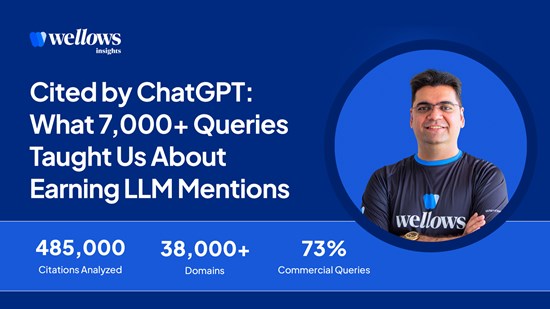Developer Offer
Try ImaginePro API with 50 Free Credits
Build and ship AI-powered visuals with Midjourney, Flux, and more — free credits refresh every month.
Wellows Report Uncovers How ChatGPT Selects Content Sources
Ever wondered how AI models like ChatGPT pull information from the vast expanse of the web to answer your questions? A new report has just pulled back the curtain on this digital mystery, and the findings could change how we think about content and SEO forever.
Wellows, an AI-powered marketing automation platform, has released a comprehensive research report after analyzing over 7,000 real-world queries. The study, based on data from the company's KIVA AI SEO platform, reveals the critical patterns behind how ChatGPT chooses which sources to trust and cite. Let's dive into what they found.

Key Findings from the AI Citation Report
The research analyzed a massive dataset of 485,000+ citations across more than 38,000 domains. The results highlight a new landscape for content discovery, with clear winners and actionable strategies for businesses aiming to get noticed by AI.
The Battle for Citations: Big Players vs. Niche Experts
You might think it's a game only the big players can win, but the data tells a different story. While the top 50 most-cited websites command a respectable 48% of all AI mentions, a surprising 52% of citations are awarded to smaller, highly specialized niche websites. This is fantastic news for experts and boutique brands, proving that deep, focused expertise can effectively compete with the broad authority of web giants.
Which Types of Websites Does ChatGPT Trust Most?
The study broke down which categories of websites earn the most citations, revealing AI's clear preferences:
- Tech News Sites (46.5%): Platforms like TechRadar, CNET, and PCMag are the dominant sources.
- Product & Software Companies (25.3%): Direct sources like OpenAI, HubSpot, and Jasper.ai are frequently cited, especially for product-related queries.
- Academic & Research Institutions (6.6%): Universities and formal research organizations are trusted sources.
- Consulting Firms (4.8%): These firms make up a smaller but still significant slice of citations.
Content Freshness vs. Evergreen Authority
The report uncovered a nuanced approach to content age. For queries containing time-sensitive keywords like "latest" or a specific year, ChatGPT heavily favored the most recent, up-to-date sources. However, for broader, evergreen topics, the AI often prioritized older, more comprehensive, and authoritative content over newer but less detailed posts.
The Rise of Generative Engine Optimization (GEO)
These findings have profound implications for businesses. As Masab Gadit, founder and CEO of Wellows, noted, there's a powerful 'double win' effect for top companies. "If you're recognized as one of the best in your category, AI boosts your presence by citing your own domain as evidence," said Gadit.
The takeaway is that a successful digital strategy now requires a blend of traditional SEO and what is being called "Generative Engine Optimization" (GEO). This involves optimizing content not just for search engine crawlers but for AI understanding. Wellows advocates for a "Visibility Stack" approach, which includes creating content with AI-friendly structures like FAQ sections, summary bullet points, and clear formatting to make it easier for platforms like ChatGPT to parse and cite.
To explore all the data and strategic recommendations, you can view the complete Wellows report on their website.
Compare Plans & Pricing
Find the plan that matches your workload and unlock full access to ImaginePro.
| Plan | Price | Highlights |
|---|---|---|
| Standard | $8 / month |
|
| Premium | $20 / month |
|
Need custom terms? Talk to us to tailor credits, rate limits, or deployment options.
View All Pricing Details

